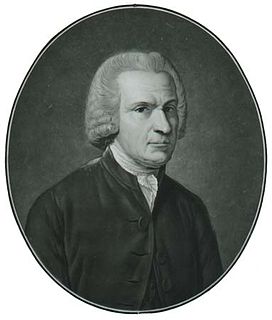A Quote by Samuel Johnson
A man of genius has been seldom ruined but by himself.
Related Quotes
The Man of Genius may at the same time be, indeed is commonly, an Artist, but the two are not to be confounded. The Man of Genius,referred to mankind, is an originator, an inspired or demonic man, who produces a perfect work in obedience to laws yet unexplored. The artist is he who detects and applies the law from observation of the works of Genius, whether of man or nature. The Artisan is he who merely applies the rules which others have detected. There has been no man of pure Genius, as there has been none wholly destitute of Genius.
I regret that I must so continually use the word genius, as if that should apply only to a caste as well defined from those below as income-tax payers are from the untaxed. The word genius was very probably invented by a man who had small claims on it himself; greater men would have understood better what to be a genius really was, and probably they would have come to see that the word could be applied to most people. Goethe said that perhaps only a genius is able to understand a genius.
In his scientific genius, man has wrought material miracles and has transformed his world. He has harnassed nature and has developed great civilizations. But he has never learned very well how to live with himself. The values he has created have been predominantly materialistic; his spiritual values have lagged far behind. He has demonstrated little spiritual genius and has made little progress toward the realization of human brotherhood. In the contemporary atomic age, this could prove man's fatal weakness.
The man of genius possesses, like everything else, the complete female in himself; but woman herself is only a part of the Universe, and the part can never be the whole; femaleness can never include genius. This lack of genius on the part of woman is inevitable because woman is not a monad, and cannot reflect the Universe.
Genius is answerable only to itself; it is the sole judge of the means, since it alone knows the end; thus genius must consider itself as above the law, for it is the task of genius to remake the law; moreover the man who frees himself from his time and place may take everything, hazard everything, for everything is his by right.


































